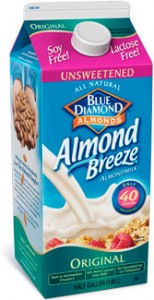 I’ve been browsing various random Vitamix smoothie recipes online, and I’ve repeatedly seen people using almond milk and flax oil. I suspect that this is a result of people working from smoothie recipes that were written to be able to be made in any old blender. Powerful blenders can process whole almonds and flax seeds at the same time that they are processing the rest of your smoothie. Using whole ingredients is more nutritious, cheaper, and easier.
I’ve been browsing various random Vitamix smoothie recipes online, and I’ve repeatedly seen people using almond milk and flax oil. I suspect that this is a result of people working from smoothie recipes that were written to be able to be made in any old blender. Powerful blenders can process whole almonds and flax seeds at the same time that they are processing the rest of your smoothie. Using whole ingredients is more nutritious, cheaper, and easier.
The only reason I can think of to stick with the extracts would be if you were looking to minimize fiber. But many people are using whole fruits and vegetables, so it seems that they don’t have a problem with it. Powerful blenders will turn whole seeds and nuts into a nice smooth consistency.
Nutrition
Whole flax seeds have protein and fiber that the extracted oil lacks. Plus, flax oil goes rancid quickly, and everything I’ve read says that rancid oils are unhealthy. Whole flax seeds seal out oxygen and prevent the oil from becoming rancid.
 Many almond milks have additives and/or sweeteners that might not be so healthy. I was surprised to find on the the NutritionData.com pages that (unsweetened) almond milk has similar ratios of fat:fiber:protein as whole almonds. (I would have thought that filtration would remove more of the fiber.) On the other hand, I was further surprised at the amazingly small amount of almond content; see comparison below. (Short version: 1/2 gallon of commercial almond milk has the nutritional equivalent of less than 2 oz (1/2 cup) of almonds!)
Many almond milks have additives and/or sweeteners that might not be so healthy. I was surprised to find on the the NutritionData.com pages that (unsweetened) almond milk has similar ratios of fat:fiber:protein as whole almonds. (I would have thought that filtration would remove more of the fiber.) On the other hand, I was further surprised at the amazingly small amount of almond content; see comparison below. (Short version: 1/2 gallon of commercial almond milk has the nutritional equivalent of less than 2 oz (1/2 cup) of almonds!)
Update: There are now even some class-action lawsuits accusing almond milk makers of not including enough almonds. How do commercial almond milks get away with such a small amount of almonds? The answer is “gum.” Look on the label of a commercial almond milk and you will likely find some combination of carrageenan, locust bean, gellan, guar, and/or xanthan gum. These additives help keep the product from separating, but also give it a thicker and “creamier” mouthfeel, without requiring more almonds.
 Price
Price
Flax seeds can be had for under $3/lb, whereas flax oil I’ve seen is usually $12-$18/lb. Now if you only care about the oil content of the seeds, by weight flax seeds are 42% oil, compared to 100% for flax oil, so the oil content of $3/lb seeds costs $7.14/lb oil. And then of course there’s the extra protein and fiber that you get from the whole seeds. That said, I generally prefer chia seeds to flax.
Almond milk is usually at least ~$3/half gallon. That half gallon contains 8 1-cup servings, each of which has 3 grams of fat and 1 gram of protein, so $3 bought you 24 grams of fat and 8 grams of protein. Meanwhile, you can get almonds at Trader Joe’s for $4.49/lb. A 1lb bag of whole almonds contains 16 1-oz (¼-cup) servings, each with 14 grams of fat and 6 grams of protein, so $4.50 bought you 224 grams of fat, and 96 grams of protein! That’s 5¢/g protein, vs. 38¢/g protein for the carton of almond milk—8-fold cheaper. So even if you increased your cost of almonds 4x by buying the fanciest organic almonds you could find, you’d still come out at half the price!
Convenience
Nuts and seeds will keep in the fridge for months (or in the freezer for years), so you can stock up and not worry about constantly restocking. Also, nuts are much more compact than nut milk so you save space.
So if you’ve been using nut milk and oil extracts, I highly recommend trying out the whole seeds/nuts. Or, if you’ve been on the fence about buying a powerful blender, this is another reason why they’re worthwhile.
Update: I recently found out that you can blend vanilla beans into a smooth texture.

Would making almond milk work by using a cup of raw unpasteurized almonds with 2 or 3 cups of water in a Vitamix blender on high for 2min. and then drinking the milk with what ever?
Yup, that would work. I previously wrote about my almond milk technique here: https://joyofblending.com/instant-unfiltered-almond-milk/
Excellent pricing info!